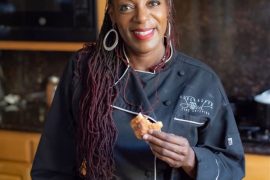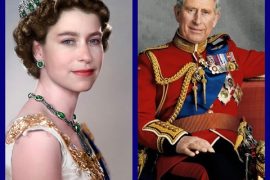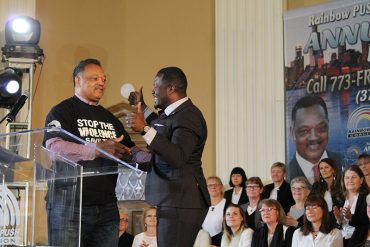Dr. Robert Jordan has been a face at WGN News for a long time. He is retiring from the day to day newscast as of September 25.
“Bob has dedicated his career to informing Chicago for more than four decades,” Jennifer Lyons, news director of WGN, said in a statement. “His dedication is unparalleled; he is truly a legend in Chicago broadcasting.”
Jordan, 72, expressed “deep and ambiguous feelings” in an email to colleagues. “There are not sufficient words to express my profound gratitude for your wonderful friendships to those of you whom I have known for so long,” he wrote. “It has indeed been my pleasure to have known you and to have been able to call you a colleague and friend.”
We caught up with him to talk about his career from when he got started to now.
How did you become interested in media?
I have always been gregarious. As a child growing up in Nashville, Tennessee, I lived on the campus of Tennessee State University and performed in the children’s theater. Ever since, I have felt comfortable being on a public stage. In high school I was on the year book committee and continued leaning in the direction of media. And while I was a biology major in college, I always yearned to work in television news. Eventually, after getting out of the army, during the Vietnam War, I applied to a television station in Nashville and was given a “starter” job working as a booth announcer – eventually going on-air as a morning weatherman and noon news anchor.
You have been appeared on TV since 1970, with an illustrious career from reporter to anchor. What have you learned along the way?
I have learned that getting the story right, the first time, is crucial; make sure the information is factual. Even then, people will see the story based on their own prejudicial leanings. For example: after reporting on a story that was controversial, I have had people from both sides of the issue thank me for telling the story correctly. Likewise, I have reported on issues where both sides thought I was unfair – then I also knew I got it right. I have also learned that most people are kind and gentle. Over the years, I have heard from thousands of people who have contacted me just wanting to talk and express their feelings. People want to be heard and not feel that they have no voice.
What has been your most interesting story?

Her story touched me deeply as testament to the horrible ravages of drugs. Her strung-out mother couldn’t overcome the powerful urges of crack and instead left her own daughter to die. Darwin’s teacher said that before her mother became addicted, the little girl used to come to school neat and clean. I felt so sorry for both of them. I understand that Darwin is doing well today and I hope her mother – after spending time in prison – has recovered and is getting her life back together.
You are a well-rounded media person, from writing articles to screenplays, what is your favorite medium?
I love writing and spend most of my off time writing something. I just completed a book entitled, “Second-hand Murders: How TV News Gatekeepers Decide Which Murders to Cover and Which Ones to Ignore.” In the book I look at how there is so much importance given to the murders of some people but so little given to others. This has become a hot topic and my book is coming out at a very propitious time.
How did the Alzheimer’s Memory Preservation Project come about?
I have done some work with the Alzheimer’s Memory Preservation Project over the years and like the work that they do. My wife Sharon’s mother is 101-years old and has been living with Alzheimer’s for the last 15-20 years. My mother died with Parkinson’s syndrome – showing many of same signs and symptoms as Alzheimer’s disease. So, I have wanted to help families realize the importance of recording their ancestors as soon as they can, to protect and preserve the wonderful memories that they have. Every family has some great memories to hold on to for their children to learn from and enjoy.
In addition to your news reporting, you have developed a business telling the biographies of prominent Chicago families; how did you begin your business?
I have always been interested in the histories of families. So, about 12-years ago I began aiming my video production company in the direction towards doing documentary-style, 90-minute family histories to help the families preserve their histories. These productions are like movies, take six to eight months to compete, and require a great deal of travel. These broadcast quality productions are expensive to produce so I had to seek out families who could afford to pay for something like this; usually in the six-figure range. We have families all across the country who have commissioned us to help them tell their stories.
What do you do in your spare time?
I am at my happiest when I am playing with my 4-year-old granddaughter, Vivian. She is a great combination of her parents, Karen and Christian Farr. I also enjoy movies and my wife, Sharon, and I love to travel.
What will you do as you approach retirement?
September 25th is my retirement day at WGN Television. I may make an appearance once in a while to help out with “specials” and other programs, as needed. And while my days on Channel9 will end, I’ll remain busy with my production company working as much as I choose.
What advice would you give to a young person interested in media in today’s digital world?
Find a special niche if possible and become the best at what you do in that area. Then you become the authority who is sought-out because of your expertise. I went back to school at age 50 to get a doctorate. I thought, I could be 54 with it or 54 without it. So, I decided to enroll and be 54 with it; one of the best decisions of my life.
What’s on your playlist?
Most people would be surprised. I have quite a mixture of jazz, Afro-Cuban salsa, classical music and opera.






